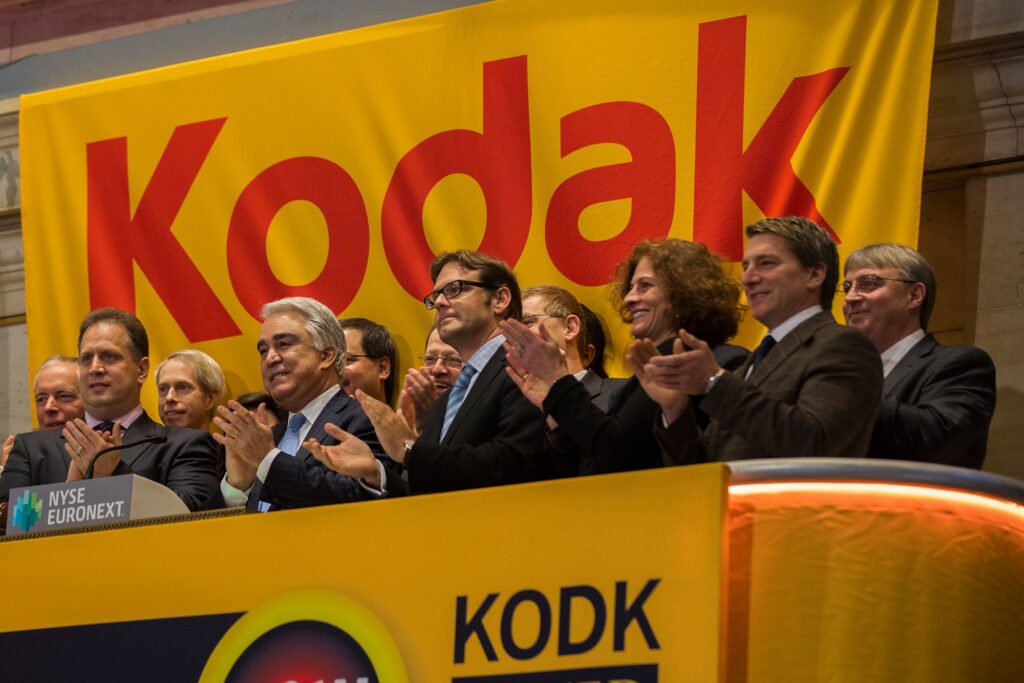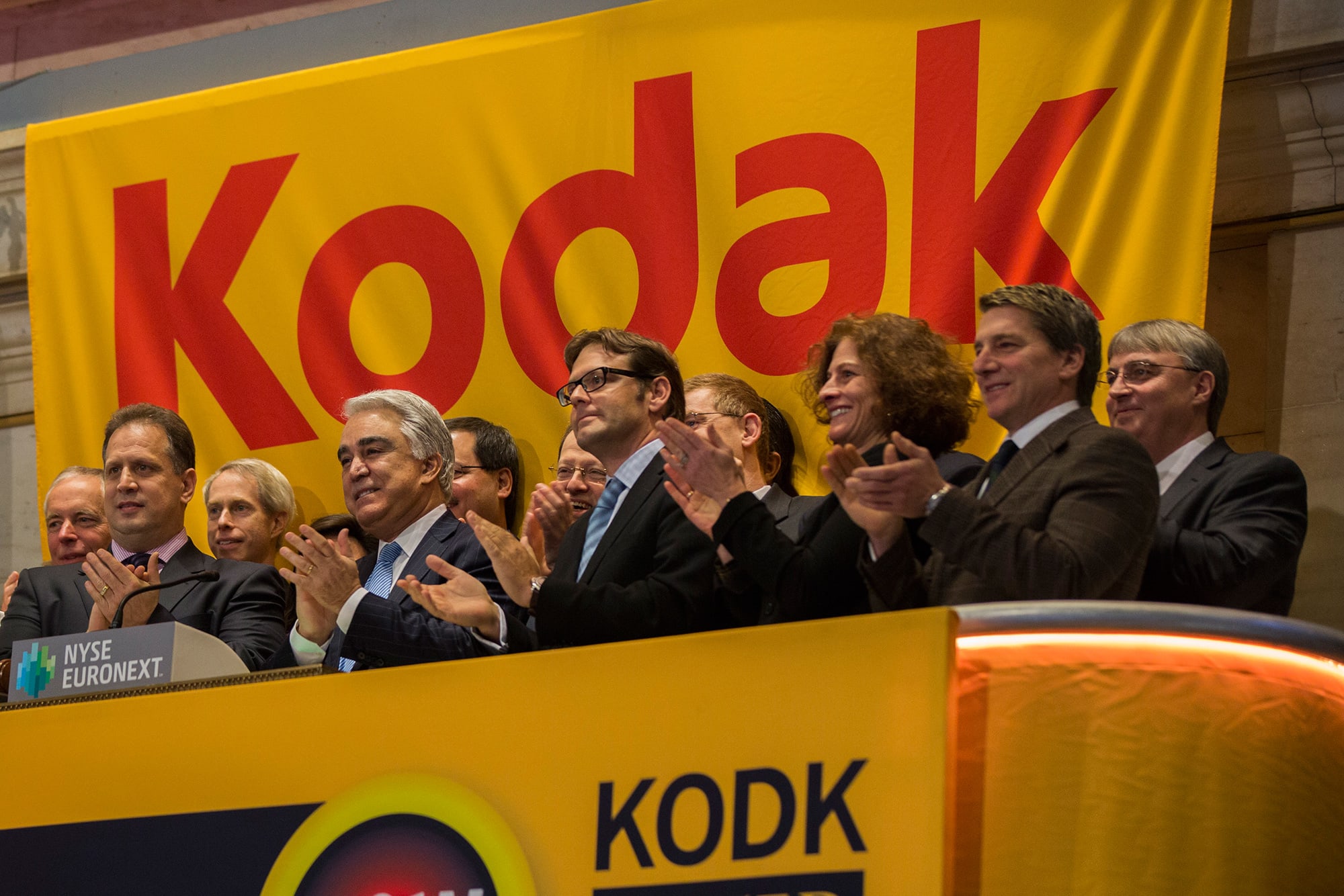In business, there is a saying: “adapt or die.” This phrase really captures the importance of remaining up-to-date with market trends. Modernizing is very critical in all aspects of business, especially considering our technological climate. Nowadays, falling behind the times can actually prove to be very harmful, leading to many missed opportunities. There are countless examples of businesses failing to adapt and consequently being surpassed by innovative competitors. A recent example of this is Kodak, at one point, the world’s largest photography corporation.
In August, Eastman Kodak ($KODK) announced that it will enter into the pharmaceutical industry. Yes, the company known for its cameras is attempting to transition to produce drug ingredients. Although its best days are behind it, the company is attempting to make a late attempt to adapt itself. However, the opportunity to adapt passed decades ago, and this latest attempt demonstrates that.
A Snapshot of Kodak

At one point, Kodak was the leader of photography in the United States, holding 90% of U.S. film and 85% of U.S. camera sales. However, the company lost this stranglehold on the industry with the introduction of digital photography. Funny enough, Kodak actually created the first digital camera in 1975. However, the company failed to utilize it effectively.
The company believed that it would be able to generate more money with its traditional cameras and chose not to focus on digital. This would be a costly mistake for the company. Because of that mistake, the company floundered for years, eventually filing for Chapter 11 bankruptcy in 2012.
Since then, Kodak has shed a significant amount of debt and has been trying to find an identity for itself. Bouncing from printer products to phones to even cryptocurrency in 2018, the once-camera-conglomerate was struggling to find that new product that is relevant in today’s technological climate. Unfortunately for the company, none of these ideas really panned out, and its business suffered because of it.
A Late Attempt to Adapt
Kodak is trying again, and, this time, circumstances are different. We are currently in the midst of one of the greatest global pandemics in world history, and the race for a vaccination is in full swing. Seeing this, Kodak believes this can be an opportunity for them, and the United States government agrees.
The government is willing to issue $765 million as a loan to the ailing corporation so it can produce pharmaceutical ingredients. This could prove to be tremendous for Kodak, as it could be the spark of life that the 132-year-old company desperately needs.
This new venture would be referred to as Kodak Pharmaceuticals, and it would be tasked with producing pharmaceutical ingredients, including for the drug hydroxychloroquine, that are currently in demand. This move is expected to generate a total of 1,560 jobs, which is great given the current state of the U.S. economy.
This loan, however, is not a reality just yet, as it was only discussed in a letter of intent. Whether or not this deal will even come to be is still up in the air. Currently, the SEC is investigating Kodak over concerns regarding insider trading, halting the move for the unforeseeable future.
Controversy Surrounding the Move
Upon the news, the stock went from as low as $2 to $60 in intraday trading, an increase of over 1,000%. Such bizarre activity on the market is typical in 2020, but this is different. Coincidentally, a day prior to the announcement, CEO James Continenza was granted 1.75 million shares of company stock. This was only some of the suspicious behavior involving Kodak executives, who were expected to make millions from this stock rally. Massachusetts Senator Elizabeth Warren called for the SEC to investigate the company right after its stock surged, as insider trading became a concern.
“Our concerns regarding insider trading during the COVID-19 pandemic have only been heightened by our serious concerns arising from a series of securities transactions engaged in by Eastman Kodak Co, its executive officers and its board members.”
Rep. Maxine Waters (D-CA) and other house Democrats
She was not the only one concerned. California Representative Maxine Waters and others were expressly against the loan due to Kodak’s track record and wanted an investigation also. They point to how the company almost went under in 2012 and could not find much success in anything prior to 2020. The fact that Kodak, a struggling company by all accounts, got this loan in the first place does not sit well with them.
Desperate for a Deal
It appears that the company lobbied for such a deal, as it reported $870 million worth of spending in that category. This is noteworthy because the company only spent $5,000 on lobbying in the first quarter of 2019. Pair this with insider trading allegations, and the bigger picture does not look too good for Kodak.
President Donald Trump has said that the United States government will look into the matter to see if there was any wrongdoing. It is worth noting that President Trump was initially very optimistic about working with the company. Kodak officials said that it will comply without complaint.
As of now, it is uncertain if this loan will be approved and come into fruition for the former camera conglomerate. If it were to happen, expect a tremendous rise in stock price, as its value sank down to the $7 range. But, if it does not, then all of those who purchased shares hoping for the best will likely experience the worst.
Kodak Didn’t Adapt, Time to Die
Kodak is the perfect example of a company that failed to adapt when it had to. The company missed opportunity after opportunity to modernize its business. It created the technology that would eventually lead to its downfall. Instead of trying to go all-in on technological innovation, the company sought to stow it away, hoping no one else would learn of it.
The company underestimated the effects digital photography would have on its operations. Management never expected it to disrupt the industry as it did. Additionally, Kodak also underestimated the ability of its competition, believing that there was no way they could surpass them.
In other words, Kodak executives got complacent. They saw their market share in the industry and felt they were untouchable. However, no one is untouchable in business. Even Amazon CEO Jeff Bezos admits that his own company will eventually fail. As a manager, it is your responsibility to fend off this inevitable demise by constantly adapting to the market.
Kodak had more than enough time to adjust. The disruption caused by digital photography happened over many years. Instead, Kodak prioritized short-term profits over long-term success, and that is truly how the company crumbled.
That ultimately made Kodak an outdated shell of its former self. As a result, the company has been floundering ever since. Unable to find success, it has been desperately trying to form a new identity for itself.
This desperation is evident based on its recent actions. Spending so much on lobbying to join an industry that you have no real relationship with seems like a last-ditch effort more than anything else. Further, if executives really partook in illegal trade activity, then it demonstrates where their priorities lie. They are more focused on their own bottom line than anything else, which is truly a shame.
Takeaways
There are two excellent lessons to be found in Kodak’s attempt to enter the pharmaceutical industry. For one, you should always be ethical in business. In this instance, there are allegations of white-collar crime, which may result in fines and jail time. While the reward may seem enticing, it is definitely not worth it. The odds are in favor of you getting caught. Further, white-collar crimes, like fraud, are not victimless. People get hurt in the process, just look at Enron and Luckin Coffee. Be a good person, and have integrity in everything you do.
The second takeaway is that, in business, you either adapt or die. If you do not consistently stay up-to-date with the times, then others will surpass you. If you are a business owner, like in the case of Kodak, modernizing your approach to the market is crucial in outlasting competitors.
However, this does not only apply to businesses; this is relevant even on an individual level. By consistently teaching yourself relevant skills, you could stand out more to a recruiter or an employer compared to your peers. This could lead to job opportunities or promotions. It could also allow you to pick up on trends in the market and recognize potential business opportunities. Mark Cuban, a billionaire investor from SharkTank, says he even reads books on a daily basis to stay up-to-date with technological innovations. He is a billionaire and still tries to adapt to the changing world around him.
So, adapting on a personal level to the world around you can make your life better. It increases your human capital, which can provide you with more opportunities to grow, learn, and earn more.

